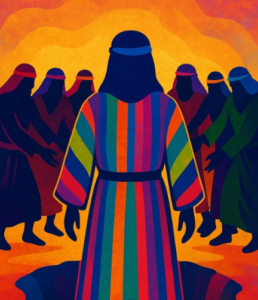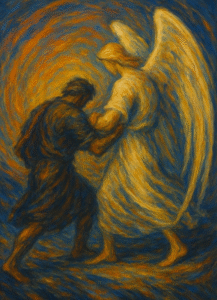- Faith ⬦ Read ⬦ Shabbat ⬦ Weekly Torah Portion
How Do You Earn Respect (Kavod)? – Parshat Shemot
Who doesn’t want to be honored and respected? Everyone wants honor, but who decided that honor is something that a person needs to request, seek after, and even suffer humiliation for—just to get some respect? Let’s learn about a different type of honor where a person chooses on his own to honor another. This kind of respect is actually the completion of G-d’s honor, and in its merit, we will be freed from all our troubles, including the exile we are suffering in now. This is the message of this week’s parsha.
This week’s Torah portion is parshat Shemot. The Torah tells of the enslavement of the Nation of Israel in Egypt. After Joseph and his brothers passed away, the Egyptians began to enslave the Jews with hard labor and treated them cruelly. Pharaoh decreed that all the male children who were born to the Jews would be cast into the Nile, along with other unbearable decrees. During the time of this decree, Moses was born, and his mother Yocheved placed him in a basket in the Nile in a last-ditch attempt to save him. Batyah, the daughter of Pharaoh, discovered Moses on the bank of the river and rescued him from the water, raising him in the house of her father Pharaoh, the king of Egypt. This whole sequence of events was beyond belief.
Moses grew up in Pharaoh’s house and rose to greatness when Pharaoh appointed him over his house (Rashi on Exodus 2:11), and yet he did not turn a blind eye to the bondage of his Jewish brothers. His empathy for them caused him to go out to see them, and he observed their sufferings, as is recorded in the Torah: “In those days, when Moses was grown, he went out to his brothers and saw their suffering. He saw an Egyptian man beating a Jew, one of his brethren. He looked all around, and when he saw no one was there, he struck down the Egyptian and hid his body in the sand. He went out on the second day, and behold, two Jews were quarreling, and he said to the wicked one, ‘Why are you striking your neighbor?’ ‘Who appointed you ruler and judge over us?’ he answered him. ‘Are you planning to kill me in the same way that you killed the Egyptian?’ Moses became frightened and said, ‘I see the matter has become known” (Exodus 2:11-14).
When Moses realized that it was now common knowledge that he had struck down the Egyptian, he became afraid. Rashi brings the Midrash which explains that Moshe started worrying when he saw that there were wicked Jews who were informers. He said: “If that is the case, then perhaps they are not worthy of being redeemed. Indeed, if this matter is widely known, now I can understand that which I was wondering about: What sin could the Jews have done that could be worse than all the seventy nations that they should be sentenced to hard labor? But now I see that they deserve it” (Shemot Rabba 1:30).
Rabbi Natan expresses his great astonishment at Rashi’s words which are quoted from the Midrash and asks: “Is it possible that for the sin of gossiping and informing the Jews should deserve to be sentenced to hard labor—were they worse than all the seventy nations? Can we compare the gossip between Jews—no matter how bad it might have been—with the sins of the nations which involved wars, murder, and far more severe crimes? Why, then, was the Nation of Israel specifically doomed to suffer exile rather than any of the other seventy nations?
To understand these things, let us examine the root cause of the exile of the Nation of Israel to Egypt, as it is explained in a lesson taught by Rebbe Nachman:
The kavod (honor) is the root of all souls, and when the soul passes away, it passes into the kavod which is its root, in the aspect of: “the glory (kavod) of G-d shall gather you in” (Isaiah 58:8). Because the kavod is the root of the soul, a defect in kavod signifies a defect in the soul. Honor is the root and garment of the soul, and when kavod comes to a person, it can come in one of two ways. One, it could be that it has come to take the soul with it because it is the root of the soul; it comes to collect (take) the soul, as in the verse, “the glory (kavod) of G-d shall gather you in.” The second possibility is the aspect of “middah tova merubah—the measure of good is great,” which means, the reward is greater than the punishment. Usually, the kavod that enclothes the soul comes in order to renew the soul and to strengthen its power. Therefore, a person must be very careful not to damage the kavod, meaning he must be careful not to take the honor for himself, because it can, G-d forbid, cause a person’s soul to depart.
For example, if a person rises to greatness, it may sometimes signify that he is at his end, because the kavod that is the root of the soul is revealed in order to collect the soul. But “middah tova merubah—the measure of good is great” and usually when a person rises to greatness it means that his soul has grown, and new channels and additional abilities are being opened up for him in his soul that were hitherto hidden and dormant. This would mean that now he will be able to exercise these powers of the soul and reach his spiritual goals more easily.
However, Rabbi Nachman teaches, “Anytime that there is a concealment of G-d’s face and harsh judgments arise, G-d forbid, then the kavod falls to the brazenfaced of the generation, that is, the nations of the world, and the wicked forcefully take the leadership, kingship, power to rule, and also the kavod which really belongs only to G-d” (Kitzur Likutei Moharan I, 67).
Now let us return to the enslavement in Egypt that is described in our parsha. The essence of the exile in Egypt, the first exile of the Nation of Israel—which included within it all the subsequent exiles as has been stated—is rooted in the fact that the kavod and kingship of G-d fell into the hands of the wicked Egyptians who took the kavod for themselves by physical force and enslaved the Nation of Israel to whom all the honor and kingship truly belong, because everything was created only for the Nation of Israel. When the Egyptians took for themselves the kavod of holiness, they essentially wanted that all the souls of the Nation of Israel whose roots are in the honor of G-d would become enslaved to them, as it is written: “He takes pride in Israel” (Psalms 68:35), because, as we mentioned, the honor is the root of our souls.
“…he must be careful not to take the honor for himself, because it can, G-d forbid, cause a person’s soul to depart!” – Rebbe Nachman
If indeed the Nation of Israel had descended to Egypt against their will, being compelled by the Egyptians, they could not have endured the humiliation they received from the Egyptians. G-d did a great and profound kindness for the souls of Israel that the descent into Egypt came through the exaltedness of the honor of Joseph who had ascended to greatness there, as it is written: “And you shall tell my father of all my honor in Egypt and all that you have seen, and you shall hasten and bring my father down here” (Genesis 45:13). In any case, it had been decreed that the Nation of Israel was to go into exile in Egypt. (As it is stated in the Kabbalistic writings, it was to correct the sin of Adam HaRishon who was defiled through eating from the Tree of Knowledge). If they had gone down to Egypt in humiliation, G-d forbid, being forced to do so by the Egyptians—as our sages said: “Our father Jacob should have gone down to Egypt in iron chains…However, his merit caused him to go down without suffering” (Shabbat 89b)—they would never have had the strength to withstand the bitterness of the exile, despite the fact that afterwards the Egyptians overcame them and forcibly took for themselves the kavod which is the root of the souls of the Jewish people and enslaved them. But they were unable to conquer the souls of Israel completely, because of the power of Joseph who had merited to the kavod of holiness.
Therefore, when Moses saw how “an Egyptian was striking one of his Jewish brothers” (Exodus 2:11), it grieved him to no end. How could the honor of G-d have fallen so low that an evildoer could take the honor and rulership for himself and thus humiliate a Jew so blatantly? He received the answer the next day when he went out again and saw two Jews, Datan and Aviram, quarreling with each other. It was then that Moses understood the reason and said, “Surely the matter is known.” From where do the wicked goyim draw the power to take the kavod for themselves and humiliate the Nation of Israel? It is from the fighting and quarreling between the Jews themselves and from their informing on one another. This is why the people of Israel deserved, more than all the seventy nations, to be humiliated and humbled, because when the children of Israel do not treat each other with respect—and even worse, when they humiliate and demean one another—this damages both G-d’s honor and the honor of the Nation of Israel and gives the goyim the power to humiliate the Nation of Israel.

“Is it possible that for the sin of gossiping and informing the Jews should deserve to be sentenced to hard labor—were they worse than all the seventy nations?”
This is the reason why the Nation of Israel deserved to undergo such a suffering in Egypt, more than all the seventy nations: because all the other nations are not connected to the honor of G-d. Only the people of Israel, of whom each one contains part of the kavod of the Shechinah (Divine Presence), are connected to the honor of G-d, for everything was created only for them, as it is written: “I created them for my honor” (Isaiah 43:7). Israel is called “His honor” (see Likutei Moharan I, 14). When Jews do not show respect for one another, the goyim and the wicked take the honor for themselves and humiliate and enslave the children of Israel.
All this applies to each and every one of us, especially at this time when we are very close to the coming of the Messiah. Rabbi Natan explains it with a parable: It is like when two people are fighting and one of them sees that the other is close to victory. He then will make an extra valiant attempt to overcome his foe. So too, because we are very close to the coming of the Messiah, the Sitra Achra (“the Other Side”) wants to push off the redemption through creating controversy, by causing one person to depreciate the honor of another, and especially by creating arguments between the tzaddikim who are on a higher level and therefore have a greater level of kavod. And when the kavod of the tzaddikim is damaged, G-d forbid, it is much, much more terrible. In fact, as we saw above, Rebbe Nachman taught that a person should be very careful not to take the honor for himself; the real honor is when a person is careful to show respect for others, as it is written: “for those who honor Me shall I honor” (Samuel I, 2:30). And as our sages said, “Who is he that is honored? He who honors his fellow human beings” (Pirkei Avot 4:1).
When we are careful with each other’s honor and when the entire Nation of Israel will together assemble all the parts of the kavod of the Shechina, then the honor of G-d will be perfected and the kingship and honor will ascend and return to G-d in perfection, and then we will be privileged to be redeemed from this exile. May we soon merit to see the perfection of G-d’s honor.
(Based on Likutei Halachot Chovel b’Chavero 3:5)
- book of Exodusconcealment of the Divine presenceDvar Torahegyptempathyemunahexilefaithgossiphard laborHonorhonor of the CreatorhumiliationJewish spiritualitykavodKingshipLashon HorahLikutey HalachotLikutey Moharanmeasure of goodmiddah tovaNation of IsraelParshaParshat ShemotpharaohReb NosonRebbe Nachmanrespectseventy nationsslavery and egyptWeekly Torah PortionYosef Hatzaddik
- 0 comment






















